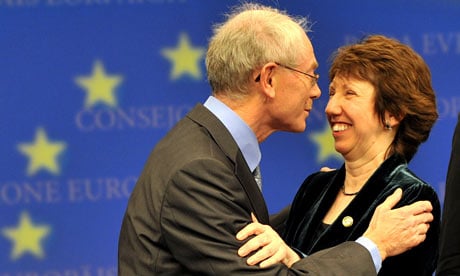
Georges Gobet/AFP/Getty Images
Catherine Ashton, High Representative of the Union for Foreign Affairs and Security Policy, and Herman Van Rompuy, President of the European Council, called it quite. They both announced in a matter of days that they would retire from their respective positions at the end of their mandates. Based on the Treaties, both positions are renewable. In the case of President Van Rompuy, his mandate of two and half years had already been renewed in May 2012 until December 2014. EU foreign policy chief will retire in 2014 with the current Commission at the end of her 5 years mandate
The game of thrones is officially open with each EU member state thinking about their next heirs. Naturally the big three, France, Germany and the U.K., will have more power than the other EU member states. However, new players like Poland and Czech Republic could have an increasing say on the selection of the next chiefs.

AFP
As argued by Judy Dempsey, Berlin and Paris are the key to the thrones. “The way Berlin and Paris acted [in 2009] was shameful for two reasons. First, Merkel did not want the European institutions to have strong leaders. Second, it undermined Europe’s credibility.” Berlin, London and Paris have made sure to balance more powerful institutions with less charismatic leaders. A Solana would not have been the desire candidate for the job of HR under the Treaty of Lisbon.
President Van Rompuy has certainly demonstrated his political skills and has mastered his way through the complex European roads. His prior experience as Prime Minister of Belgium played a considerable role in making him an astute politician. In the case of the HR Ashton, her legacy will be the design of the European External Action Service (EEAS). She has excelled in her job of administrator rather than foreign policy chief. Her absences following the crises in Haiti, Libya, Mali and others will certainly be remembered as a failure to lead the CSDP. During a recent event, Ashton declared: “There’s no possibility of having a second term and it needs to go to someone else next … In any event, you lay the foundations but there are people who can do things with this that probably I couldn’t do, so it’ll be good to hand it over.”
It is way too early to speculate on the next chiefs. However, based on the precedents established with the 2009 appointments, here are the job descriptions and qualifications soon to be posted on the EPSO website:
Job descriptions:
Qualifications:
Judy Dempsey certainly ends her article on a positive and wishful note when she wrote, “But they [Merkel and Hollande] can make a big difference when they choose the EU’s top leaders next year. They can nominate candidates who are not afraid of speaking their minds about Europe and who will have the confidence not to be intimidated by the member states. That is a tall order. But if Merkel and Hollande seriously want Europe to have ambitions and a strong voice, it is time to put aside their own short-term interests.”
Season two of “Game of Thrones” may be over, but the battles are only starting following lengthy diplomatic rounds in the imaginary lands of George R.R. Martin; there will be no exception for the EU – minus the dragons.